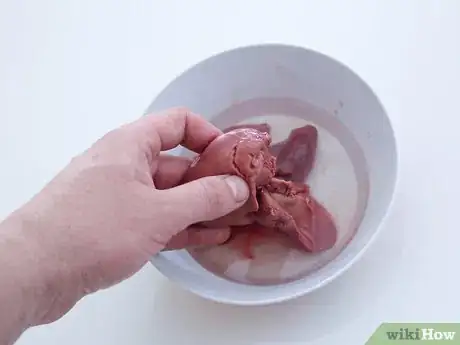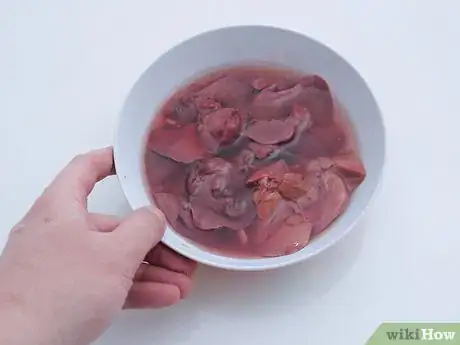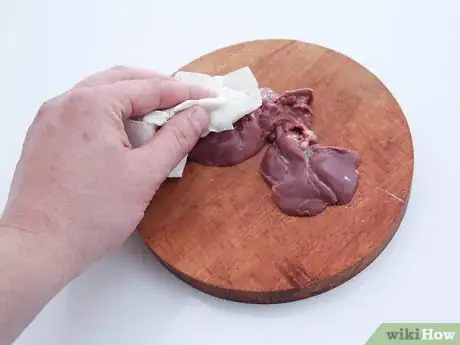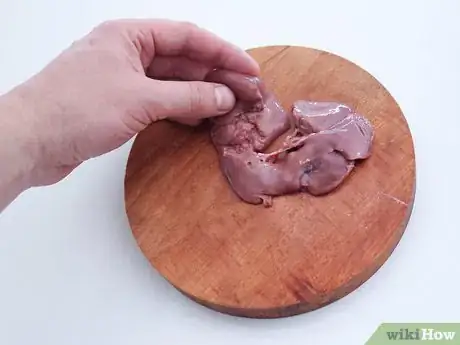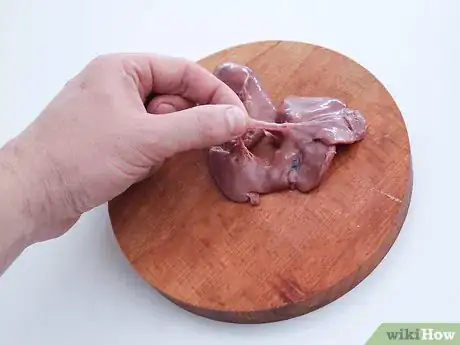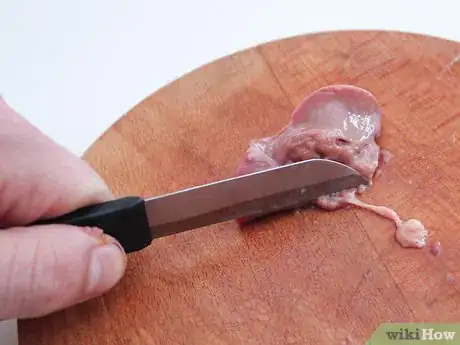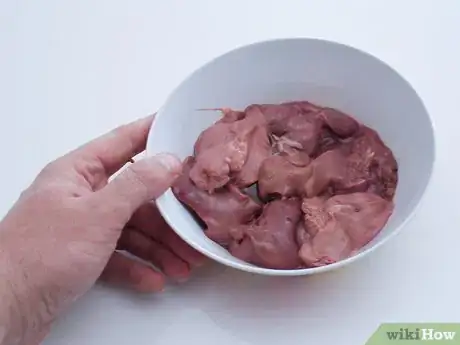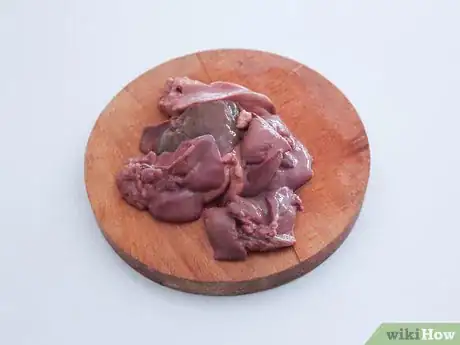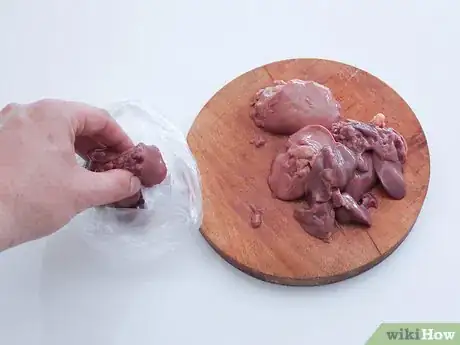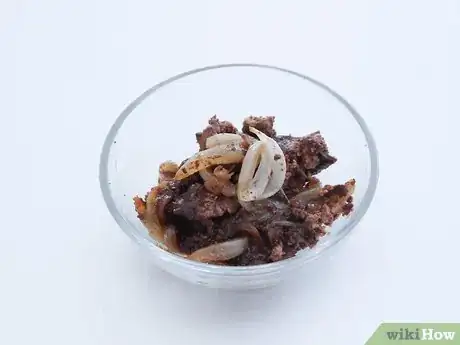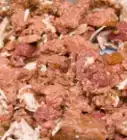This article was co-authored by Marrow Private Chefs. Marrow Private Chefs are based in Santa Rosa Beach, Florida. It is a chefs’ collaborative comprised of an ever-growing number of chefs and culinary professionals. Though regionally influenced primarily by coastal, traditional southern, cajun, and creole styles and flavors, the chefs at Marrow have a solid background in all types of cuisine with over 75 years of combined cooking experience.
wikiHow marks an article as reader-approved once it receives enough positive feedback. In this case, 98% of readers who voted found the article helpful, earning it our reader-approved status.
This article has been viewed 103,817 times.
Chicken livers are a cheap but nutritious type of meat. To prevent them from tasting bitter and to make sure they cook properly, it’s important to clean them correctly before you cook them. Soaking the livers in cold water and then removing any connective tissue will give you clean livers that are ready to cook.
Steps
Soaking Livers in Cold Water
-
1Place the livers in cold water. Fill a glass bowl with cold water – not as cold as ice water but colder than room temperature. Place the livers in the cold water. If possible, don’t lay them on top of one another.[1]
-
2Let the livers soak. You should leave the livers in the cold water for about fifteen minutes. This gives the water time to coagulate the blood, which will make it easier to remove.[2]Advertisement
-
3Drain the bowl. After fifteen minutes, hold the livers in place and dump the water out of the bowl.[3]
-
4Pat the livers dry with paper towels. Take one liver out at a time and pat it dry with a paper towel. Make sure you blot both sides of the liver. If you find some of the blood is stubborn, you might have to wet a paper towel and wipe the blood off.[4]
Removing Connective Tissue
-
1Lay out the livers. Lay out all of the livers you’re trimming so that they are flat. This might require that you unfold the livers, as they often come out of the container balled up.[5]
-
2
-
3Trim the meat away from the connective tissue. Using a sharp knife or scissors, trim the meat away from the connective tissue. This might take more than one or two passes with the knife, since each liver can have multiple areas with connective tissue.[8]
Buying, Storing, and Cooking Chicken Livers
-
1Collect chicken livers from whole chickens. If you are in the habit of buying whole chickens, you'll actually be purchasing livers at the same time. Some chickens have multiple hearts and multiple livers, so you might get more than one per chicken.[9]
- Don't use livers in giblet gravy - it can give the gravy a bitter taste.
-
2Buy the livers from a butcher. You can buy whole livers from the butcher or the meat department of your local grocery store. These livers tend to be of a better quality than what you'd get in a whole chicken, since the processing of whole chickens means the livers might be mangled.[10]
- Livers from the grocery store or butcher may come in a jar, or they might be fresh. Ask your butcher how they package them.
-
3Clean and freeze the chicken livers. Before you store the chicken livers, you should clean them so that they're ready to be used when you want them. Once you've cleaned them, lay them flat in a freezer storage bag and lay the bag flat in your freezer.[11]
- Use the livers within three to four months of freezing them.
-
4Make chopped liver. The most popular way to prepare chicken livers is by making chopped liver. Melt 5 tablespoons (2.5 ounces) of fat (either chicken fat or butter) in a pan, then sauté 2 cups (16 ounces) of sliced onions in the fat. Remove the onions, but pour the fat back in the pan, and sauté 1 pound of chicken livers until they're brown on the outside and no longer pink on the inside. Mix the livers, onions, and 3 hard-boiled eggs together and chop them finely. Season with salt and pepper and either serve within two hours or store in an airtight container in the refrigerator.[12]
Community Q&A
-
QuestionSometimes I get sleek and shiny chicken livers, but other times some are looking like they're decomposing, resembling cottage cheese. Are these okay to eat?
 Community AnswerIf these are packaged and you bought them recently, you could check with the employees at the meat counter. If you are really unsure, then do not eat them.
Community AnswerIf these are packaged and you bought them recently, you could check with the employees at the meat counter. If you are really unsure, then do not eat them.
References
- ↑ https://delishably.com/meat-dishes/how-to-cook-chicken-livers
- ↑ https://delishably.com/meat-dishes/how-to-cook-chicken-livers
- ↑ https://delishably.com/meat-dishes/how-to-cook-chicken-livers
- ↑ https://delishably.com/meat-dishes/how-to-cook-chicken-livers
- ↑ https://www.youtube.com/watch?v=i0Pb39AI2Nw
- ↑ https://www.youtube.com/watch?v=i0Pb39AI2Nw
- ↑ http://www.bbc.co.uk/food/techniques/cleaning_chicken_livers
- ↑ https://www.youtube.com/watch?v=i0Pb39AI2Nw
- ↑ http://www.nytimes.com/1989/10/08/nyregion/food-the-saving-grace-of-chicken-livers.html
